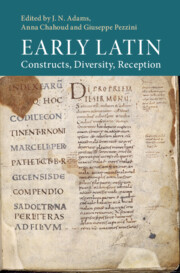Book contents
- Early Latin
- Early Latin
- Copyright page
- Dedication
- Contents
- Illustrations
- Tables
- Contributors
- Acknowledgements
- Abbreviations
- Chapter 1 Introduction: What Is ‘Early Latin’?
- Part I The Epigraphic Material
- Part II Drama
- Part III Other Genres and Fragmentary Authors
- Part IV Reception
- Chapter 20 ‘Early Latin’ and the Fragments of Atellane Comedy
- Chapter 21 Lucretius and ‘Early Latin’
- Chapter 22 Cicero and Early Dramatic Latin
- Chapter 23 Early Latin Texts in Livy
- Chapter 24 Pliny Rewrites Cato
- Chapter 25 Gellius’ Appreciation and Understanding of ‘Early Latin’
- Chapter 26 Views on ‘Early Latin’ in Grammatical Texts
- Chapter 27 Nonius Marcellus and the Shape of ‘Early Latin’
- Chapter 28 ‘Early Latin’ to Neo-Latin
- Chapter 29 Conclusions
- Bibliography
- Index Verborum
- Index of Non-Latin Words
- Index Locorum Potiorum
- Subject Index
Chapter 28 - ‘Early Latin’ to Neo-Latin
Festus and Scaliger
from Part IV - Reception
Published online by Cambridge University Press: 27 July 2023
- Early Latin
- Early Latin
- Copyright page
- Dedication
- Contents
- Illustrations
- Tables
- Contributors
- Acknowledgements
- Abbreviations
- Chapter 1 Introduction: What Is ‘Early Latin’?
- Part I The Epigraphic Material
- Part II Drama
- Part III Other Genres and Fragmentary Authors
- Part IV Reception
- Chapter 20 ‘Early Latin’ and the Fragments of Atellane Comedy
- Chapter 21 Lucretius and ‘Early Latin’
- Chapter 22 Cicero and Early Dramatic Latin
- Chapter 23 Early Latin Texts in Livy
- Chapter 24 Pliny Rewrites Cato
- Chapter 25 Gellius’ Appreciation and Understanding of ‘Early Latin’
- Chapter 26 Views on ‘Early Latin’ in Grammatical Texts
- Chapter 27 Nonius Marcellus and the Shape of ‘Early Latin’
- Chapter 28 ‘Early Latin’ to Neo-Latin
- Chapter 29 Conclusions
- Bibliography
- Index Verborum
- Index of Non-Latin Words
- Index Locorum Potiorum
- Subject Index
Summary
This chapters examines the motivation and method of reuse of early Latin in the translations from Greek poetry of Joseph Scaliger (1540-1609), the scholar to whom the study of fragmentary Republican Latin owes more than to anyone else in classical scholarship. The analysis focusses on the translations of Sophocles’ Ajax and of Lycophron’s Alexandra, which the young Scaliger produced a decade before his memorable edition of Festus’ De significatu uerborum (1576). The ancient lexicon was the main source of the obscure vocabulary that characterises Scaliger’s archaic Latin, the artificial construct of a style aimed at achieving a high register in the translation of Greek poetry. Recourse to the diction of the early Roman dramatists as a means of elevating the style had an authoritative precedent in Cicero. To latinise Lycophron’s exoteric diction Scaliger drew extensively on Festus’ glosses for rare usages and recondite synonyms. Other early-modern scholars who were engaged in the study of fragmentary Latin texts and their sources also used that variety of Latin for the purpose of translation of the Greek classics, and even for creative versification. ‘Early Latin’ is a style.
- Type
- Chapter
- Information
- Early LatinConstructs, Diversity, Reception, pp. 563 - 581Publisher: Cambridge University PressPrint publication year: 2023

